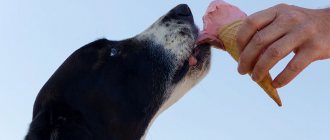People use various types of oils in everyday life; it is difficult to imagine the modern world without them. In addition, oils are often used as a natural substitute for chemicals. Their influence on humans has been proven and methods of use are known. How do different oils affect our four-legged friends? What can be used orally for dogs or given for constipation? Let's figure out which types of oils will be beneficial and which ones should not be used under any circumstances.
Vegetable oils
If you feed your dog natural products, it will be difficult for the owner to choose a menu that is so balanced that it contains all the vitamins and microelements. Many people are prejudiced against tablet vitamins, believing that they are all chemicals. Such owners are looking for substances that can saturate the dog’s body with useful substances, but will be natural.
These include oils of vegetable origin. They contain a high content of unsaturated fatty acids Omega-3 and Omega-6, vitamins A, E and D, and antioxidants.
Note that there are a huge number of vegetable oils, but not all are suitable for dogs to eat.
In addition, when feeding with dry formulas, it will not be necessary to add it to food. Everything the body needs is already contained in the granulated food.
What vegetable oils can be used?
Linen . The main advantage is the anti-inflammatory effect. It is recommended to use it for skin problems, arthritis, to maintain immunity and reduce the risk of developing allergic diseases and cancer. In addition, this oil is used as food for animals to achieve better absorption of vitamins. You need to carefully monitor the expiration date of the product - after opening the package, 1 month;
Sunflower . Contains Omega-6, vitamin E and magnesium. It is recommended to use to strengthen the heart muscle, regulate calcium levels in the body and replenish energy balance;
Olive . Contains vitamin E and is an antioxidant. Note that it will not bring much benefit to the dog. In addition, high-quality olive oil is an expensive product, and given this, it is not worth using;
Camphor . Camphor oil can only be used externally. It is an excellent local anesthetic, antiseptic and analgesic. Before use, you should consult a veterinarian, since there is a high risk of an allergic reaction;
Castor . Obtained from castor beans. It has a laxative effect, so it is prescribed for constipation, poisoning, and inflammation of the gastrointestinal tract. In addition, it can be used externally - to treat various types of wounds, cuts, mild burns;
Sea buckthorn . Versatile and very effective. The methods of its use are varied: internally, externally, rectally, in the form of inhalations. Indications are: peptic ulcer, colitis, mastitis, when taken orally it is beneficial for the coat;
Coconut . These days it is one of the most popular cosmetics among women. It is added to food and rubbed into the skin and hair. Dogs will also benefit from it - it contains almost 90% saturated fat. It is useful for the dog’s fur and skin, digestive system, immune and endocrine, nervous system;
Rapeseed . In terms of the content of useful substances it is in second place after flaxseed. However, it can cause a lack of vitamin E, so this vitamin is also prescribed at the same time;
Safflower . Rich in vitamins E, K, Omega-3. Has a beneficial effect on the heart, stomach and bone skeleton, increasing bone elasticity;
Pumpkin . Has anti-inflammatory and antiparasitic effects;
Sesame . The peculiarity is that it is rich in minerals, including potassium and iron. Provides prevention of heart disease, strengthens the bone skeleton, and prevents cancer;
Wheat germ oil . A natural antioxidant, it has a healing effect on the reproductive system of both males and females. It will provide the animal with strong nerves, a healthy heart and help with arthritis;
Peanut . Despite the large amount of vitamin E and other minerals, it is not recommended for use in the diet of dogs. It contains many additives that are likely to cause severe allergies in your pet. In addition, too much fat, its incorrect dose and frequent use can provoke the development of pancreatitis;
Cotton . Should not be used, the risk of negative consequences is too great. When processing cotton and producing oil, chemicals are used that are absolutely harmful to a living organism. This is often stated as part of ready-made feed, but its use is dictated by issues of cheapness, not benefit;
Cocoa butter . Should not be given to your pet under any circumstances. His stomach simply cannot digest this product.
Please note that oils must be used strictly following the dosage indicated on the packaging or prescribed by the veterinarian. The dose cannot be exceeded. Otherwise, such treatment will cause significant harm rather than benefit.
Role in the human diet
First of all, the benefits of vegetable oils are due to their rich fatty acid content. The raw materials and extraction method may vary, but four types of acids are always present:
- Saturated – most often found in high-calorie oils such as palm, peanut, and coconut. Used in small doses. An excess of saturated fatty acids can lead to the formation of fatty deposits, atherosclerosis, and coronary heart disease.
- Unsaturated – necessary for the body to normalize metabolic processes.
- Monounsaturated – this type includes oleic acid, which is responsible for the production of “healthy” cholesterol.
- Polyunsaturated – linoleic and alpha-linoleic acids. Prevents the development of atherosclerosis. Enter the body exclusively with food.
How to get maximum benefit?
The benefits of oil are determined by the method of processing the raw materials:
- Virgin oil - the maximum of useful microelements is contained in the product obtained by cold pressing. This oil got its name due to the fact that after the first pressing it can be filtered and then packaged.
- Extracted - the manufacturing process consists of several stages of purification and processing with organic solvents. The final product is not as healthy as virgin oil.
- Hydrated – processed with alkalis and high-temperature water in order to increase shelf life. Because of this, the oil gets rid of not only heavy metals, but also most of the beneficial trace elements.
- Refined and deodorized - has a weak color and odor. As a result of processing, the product loses almost all useful substances, except for some fatty acids.
Butter
Separately, it is necessary to say about butter, because it has become firmly established in our lives. Everyone knows that it contains a huge amount of vitamins, antioxidants and other beneficial substances. Most owners cannot imagine breakfast without this product added to the porridge.
Is it really that beneficial if you include it in your dog’s diet? It contains a lot of fatty acids, fat-soluble vitamins A, E, K, and milk fat. All this helps to absorb calcium, affects energy activity, and helps with weakening after illness.
One of the rules for use is to use it unchanged, that is, without heat treatment.
Most dog breeders prefer not to take risks and give their dogs plant-based foods, using creamy foods minimally. With frequent use, significant damage will be caused to the dog's liver. Therefore, the product is given to dogs no more than 2 times a week, adding to porridge, vegetables or other food.
Causes and effects of problems with bowel movements
In order for feces to move through the intestines, sufficient peristalsis is needed, that is, wave-like movements of the walls. If the intestines cannot cope, the reasons may be: infections, obesity or exhaustion of the body. The intestines can also “stand up” due to some disease of the internal organs.
By the way, decreased peristalsis can also occur due to anesthesia. After anesthesia, the dog’s diet should include soups and liquid cereals. It is necessary to follow all doctor's recommendations, because constipation after surgery can lead to negative consequences. Adhesions in the abdominal cavity may also be the cause.
Normal defecation is indicated by a certain volume and moisture content of the animal's stool. Large amounts of feces can accumulate inside the intestines. The same phenomenon occurs if the stool is too dry. Eating a dog boiled bones can cause the intestines to become clogged. Dogs that drink very little need to be given more liquid food. Dry dog food, however, does not cause constipation in the animal.
If a dog exhibits the following symptoms: weakness, pain in the abdomen, decreased interest in food, constant thirst, as well as vomiting and pale mucous membranes, this may indicate intoxication. In this situation, the pet needs urgent help from a veterinarian.
If there is intestinal obstruction, laxatives can worsen its condition, so it is recommended that at the first signs of illness, take the dog to the veterinarian and find out the reasons for the difficulty in defecation.
Fish oils
salmon known to everyone since childhood , is very useful, including for animals. This is a good food additive. It will replenish energy balance, strengthen the protective functions of the immune system and protect against diseases. The product is rich in Omega-3.
Include in the diet by mixing with the type of food that the pet adores. You can use it as a treat, adding a little to your food. The dosage will depend on the age, size and weight of the dog. Since exceeding the daily dose will cause more problems than benefits, you should consult your veterinarian.
crab can be used as a vitamin supplement in food . This product is often used to support puppies and ensure normal growth of the small animal. For adults, the product is used to significantly improve the condition of the coat, skin, and ensure uninterrupted functioning of the heart muscle.
Fish oils are often highly allergenic and are expensive. Before use, you need to contact a specialist who is involved in the health of your pet.
Possible signs of constipation in a dog
Many owners are faced with the problem of difficulty in defecating their animals. The reasons vary. Let's figure out why such a nuisance can occur and how to help with constipation.
Common causes of bowel problems in dogs:
- diseases of the gastrointestinal tract;
- obesity;
- dehydration;
- insufficient amount of fiber;
- low physical activity;
- age of the animal.
Symptoms of the disease are easy to notice. If the animal strains and makes efforts to empty its intestines to no avail, it means that the dog has a problem with intestinal obstruction. Because of this problem, feces will accumulate and harden, which can injure the intestinal walls. The owner should take measures to improve the condition of his dog.
Essential oils
We are accustomed to the fact that esters are a fashionable trend, used for aromatizing rooms or for cosmetic purposes. However, they can also be used beneficially for pets.
Interestingly, dogs have more than 200 million olfactory receptors; they can smell about a hundred plants that are found in nature. If you give a dog a choice of ether or medicine, the choice will be made in favor of ether.
But this same circumstance should force the owner to be very careful when using volatile oils. The dosage must be precisely adjusted so as not to harm the animal’s sense of smell.
Before considering the types that can be used, let's consider the rules for using esters :
- Always choose a 100% natural product. This costs more, but will help avoid the unpleasant consequences of using counterfeit chemicals;
- Follow the dose strictly. Dogs' sense of smell is too acute. Usually the dosage is less than for an adult;
- Carefully monitor your body's reaction to the oil. At the slightest doubt, stop use;
- The best option for using any remedy, even a non-medicinal one, would be to consult a specialist.
In what cases can ethers be used? Quite often, animals catch a cold. In this case, tea tree , eucalyptus and thyme . Directions for use: inhalation or rubbing into the chest.
Take into account the increased sensitivity of animals to odors, so start with the minimum recommended dose and gradually increase it. The maximum dose is three drops. For rubbing you need to prepare a mixture: essential oil with vegetable oil or vodka.
To treat minor wounds and cuts, itchy eczema, use lavender and tea tree oil. Take the vegetable as a basis and add an equal amount of essential oils. Rub into the affected areas until recovery. An additional effect of such a mixture will be that the animal will be left alone by flying insects.
Lavender oil can be used to treat festering wounds, dog skin in the presence of fungus, add drops to the bedding, wipe the ears, and fight fleas and ticks.
Esters are a faithful assistant in cleaning teeth and removing unpleasant odor from the mouth. Clove oil will come to the rescue . You will need to mix three tablespoons of soda, a drop of clove ether and one rosemary . Use the resulting mixture to brush the dog’s teeth, avoiding injury to the gums.
In addition, aromatherapy is effective for dogs. If your pet is stressed or weakened after an illness, you can take a mixture of ethers and add it to a kerosene lamp, as the mixture evaporates slowly.
Constipation in a puppy
A special case is constipation in a puppy. This is a serious problem, because the puppy’s body is much more sensitive. Constipation in a puppy can occur due to the accumulation of hairballs in the intestines. These lumps are called trichobezoars. They are formed from fur that the dog licks. Usually the hairs pass through the intestines unhindered, but they may accumulate in a certain area.
Sometimes puppies can swallow completely inedible objects due to their inexperience or curiosity. Stagnation can be affected by insufficient physical activity. Each puppy needs to go for a walk several times a day and engage in active games.
It is also possible that you are overfeeding your pet or that he is not drinking enough clean water. You can massage your puppy's belly or place them on a warm heating pad, and include pumpkin and celery in their diet.
In difficult cases, laxatives will help. However, drug treatment cannot be used without a doctor's prescription. After all, the puppy’s body is very susceptible. A side effect of using laxatives is disruption of colon function.
An enema is an effective remedy, but if you do not have experience in colon lavage, it is better not to try it yourself. You need to rinse several times before the effect occurs. Use a heated decoction of chamomile flowers. You must wear gloves to perform the procedure, and lubricate the tip of the bulb with Vaseline.
Be careful as the dog will most likely be uncomfortable with the procedure and will try to wriggle out and bite. You may need help holding your pet during the colon lavage procedure. Surgery may only be necessary in the most severe cases of constipation.
Currently reading:
- How to give your dog an enema for constipation
- The American Cocker Spaniel is an adroit hunter and loyal friend.
- 13 Causes of Indigestion and Diarrhea in Dogs
- All the reasons for the appearance of dandruff on a dog's coat
Briefly about the main thing
- If the dog’s diet is based on natural products, you need to use various oils as additives;
- Vegetable and fish contain many useful substances;
- Creamy foods should be used with caution, the load on the liver is too great;
- Esters have a wide range of applications in animal diseases, but they must be used carefully;
- Dosage and administration should be under the supervision of a specialist.
What foods have you included in your pet's diet? In what form do you prefer to do this? How do your friends perceive the use of such substances? What aromatic essential oils do you and your dog enjoy? Tell us in detail in the comments, your experience will help other dog lovers.
For what diseases is it indicated?
Salmon oil is recommended by veterinarians for many reasons:
- problems with the heart and blood vessels, for the prevention of strokes and heart attacks;
- arthritis and arthrosis;
- neuroses, overwork;
- dermatitis, eczema and other skin diseases;
- hair loss and fragility;
- pregnancy and feeding of puppies;
- diabetes.
When immunity decreases and recovery after operations and serious illnesses, it is also recommended to give salmon oil to dogs.
“Green gold”: benefits for the body, coat and digestive system
What effect does this life-giving liquid have on our pet’s coat? When you apply it to your skin, it becomes soft, supple and looks healthier. The oil has the same effect on your dog's coat. Even after just one week, you will notice that it becomes silky, shiny, and well-groomed.
Olive oil can be applied even in case of inflammation and irritation. It will soothe the skin and speed up healing. And it doesn’t matter whether the skin is oily or dry - active antioxidants nourish and restore the body’s cells in any case.
Olive oil for dogs has an equally important effect on their metabolism. The correct dosage will regulate this process, which sometimes leads to slight weight loss. This is especially important if the animal is prone to obesity.
Other benefits include the prevention of serious diseases such as cardiovascular disease and diabetes, as well as various aggressive forms of cancer. In fact, some elements of “green gold”, such as oleic acid, squalene and terpenoids, have a preventive effect against cancer.
The olive oil that dogs get also helps strengthen their immune system. This means that they can more easily endure illnesses and colds that occur with the changing seasons, and also recover more quickly. What about the brain? The oil “works” in this case too! It helps prevent cognitive decline and helps keep the brain healthy and active. Imagine how important “green gold” is for older dogs, especially smart and playful ones like a border collie or a poodle.
Finally, extra virgin olive oil provides dogs with the energy they need for physical activity. It strengthens the walls of blood vessels, improves blood circulation and breathing. This plays a special role in brachycephalic breeds (dogs with a short skull, in which the width of the head relative to the length is more than 80%), such as the bulldog.
Olive oil as a means for external use
Simply pour 5-10 drops of oil into a cup of water and dip your hands in it. Now give your dog a massage, rubbing the oily liquid until completely absorbed. Pay special attention to the driest parts of the body. Blot excess oil with a towel so that the dog does not lick it and stain the sofas and other furniture.
What to do if laxatives don't help
After taking a laxative, try taking your pet outside. Many well-mannered dogs cannot go to the toilet at home, even with a strong urge.
Sometimes veterinarians combine laxatives and anticonvulsants. To relieve intestinal spasms, use Baralgin, No-shpu, Novocain. They are administered after taking laxatives. However, it is not worth taking the risk. Sometimes the cause of a pet’s poor condition is acute intestinal obstruction, which can only be eliminated surgically. If laxatives do not help within 24 hours, it is better to consult a doctor.
Folk remedies
It must be said that all folk methods of relieving a pet of constipation are less effective than special veterinary drugs. But if constipation is mild and short-lived, you can use the following natural products:
- vegetable oil;
- ground prunes;
- raw egg white diluted with water;
- liquid jelly.
This also includes such a well-known remedy as an enema.
Vegetable oil
This is the most popular folk method of relieving constipation. To get a laxative effect for a medium-sized pet, a teaspoon of vegetable oil on an empty stomach is enough. For puppies and toy breeds, the dosage is reduced. Large dogs are given 1 tablespoon of the product per 20 kg of weight.
Enema
Another popular option for relieving constipation at home. Boil and cool the water. Take a rubber bulb for dwarf breeds. For large dogs, an Esmarch mug is suitable; treat its tip with boiling water. Then follow these steps:
- Lubricate the tip of the tool with oil or Vaseline.
- Fill Esmarch's mug with water and squeeze slightly to remove any air bubbles.
- Put medical gloves on your hands and a muzzle on your pet. If the dog is small, bandage the muzzle with a bandage.
- Place the animal on its side in the bath. If the dog has a calm disposition or is accustomed to the procedure, the enema can be done while standing.
- Lift the tail and gently insert the tip of the tool.
- Gradually introduce water.
- Try to calm and pet the dog so that it does not become nervous.
- After introducing all the liquid, smoothly pull out the tip of the enema.
- To prevent water from spilling out, press the tail briefly.
It must be said that an enema is undesirable if difficulties with bowel movements are caused by intestinal obstruction or volvulus. Remember that these methods relieve dogs from constipation, but do not eliminate its cause. It is necessary to treat concomitant diseases, as well as establish a regimen and diet.
Reviews
- There is a dog, a poodle breed. The veterinarian prescribed salmon oil during the shedding period. The process accelerated significantly, the new fur grew an order of magnitude thicker. There is undoubtedly an effect from taking it.
- They gave the Labrador a course of salmon oil for a whole year with breaks for rest. The coat was perfect, but after discontinuation we noticed increased hair loss.
- Previously, for the required amount of Omega in the diet, they gave their dogs heads from red fish, but no significant difference in health was noticed. After purchasing salmon oil there is a clear benefit. The dogs have become much more active, more inquisitive and follow commands with a bang!











